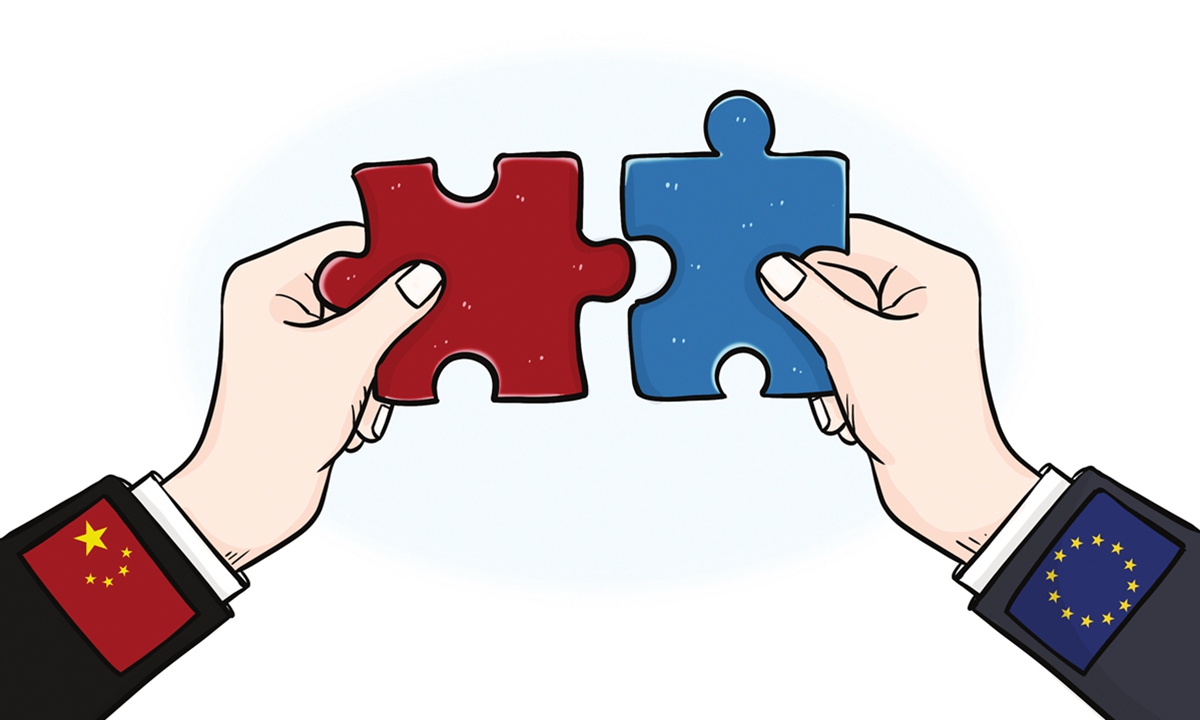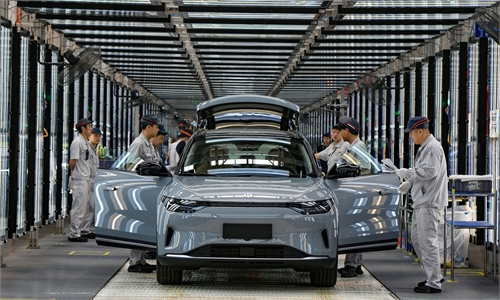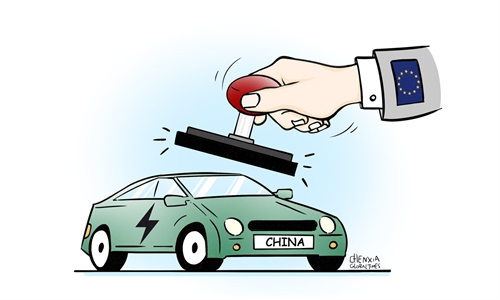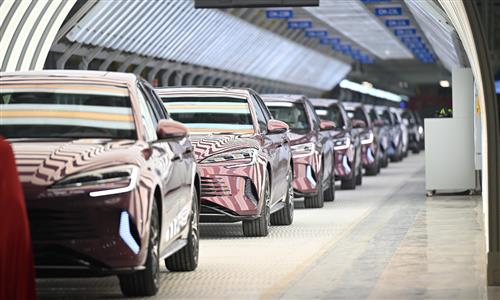
China EU relations
Multiple Chinese government departments and organizations voiced on Wednesday strong opposition to the European Commission (EC)'s decision to impose provisional tariffs on Chinese battery electric vehicles (EVs) imports and vowed all necessary countermeasures, urging the EU to immediately correct its wrongdoings. Observers said the move is purely political, helping neither EU consumers nor EU auto industries, and they added that China will take resolute measures to safeguard its lawful interests.In a statement, the EC announced on Wednesday that it will impose an additional provisional duty of between 17.4 percent to 38.1 percent on EVs from China from earlier July, despite opposition from EU member countries such as Germany, Sweden and Hungary.
The announced top tariff rate was much higher than the 25-percent rate reported by the Financial Times earlier on Wednesday.
The heavy-handed tariffs will hit Chinese brands such as BYD, Geely and SAIC. Tesla cars made in Shanghai may "receive an individually calculated duty rate at the definitive stage" following a "substantiated request."
On Wednesday, China's Ministry of Commerce (MOFCOM) urged the EU to immediately correct its wrong practices and properly address economic and trade frictions through dialogue and consultation, and vowed to take all necessary measures to firmly defend the legitimate rights and interests of Chinese enterprises.
The MOFCOM said that the European side ignores the facts and WTO rules, ignores China's repeated strong objections, and disregards the appeals and discouragement of the governments and industries of many EU member states, which is a matter of great concern and strong dissatisfaction for the Chinese side.
The Chinese industrial sector is deeply disappointed with and resolutely opposed to the move, the MOFCOM said.
The EC deliberately constructs and exaggerates the so-called subsidy program, and the assumption of abnormally high subsidy margins is a blatant act of protectionism, creating and escalating trade friction, and "destroying fair competition" in the name of "safeguarding fair competition," which is the biggest "unfairness" of all, MOFCOM noted.
China's Foreign Ministry spokesperson Lin Jian on Wednesday warned that the EU's anti-subsidy investigation into Chinese EVs violates the principles of the market economy and international trade rules, and will harm the EU's interests.
The EU's anti-subsidy investigation into Chinese EVs is essentially an act of protectionism, Lin said.
Following the EC's announcement, the China Chamber of Commerce to the EU (CCCEU) expressed its shock, grave disappointment and deep dissatisfaction.
The CCCEU maintains that the Chinese EV industry's advantage lies in technological innovation and cost management. This is achieved through continuous technological iteration and intense market competition, leveraging China's comprehensive supply chain advantages to cultivate robust market competitiveness.
The chamber voiced concern that the EC's protectionist move may escalate trade friction between China and the EU, negatively impacting economic, trade and business relations between the two economies.
The China Association of Automobile Manufacturers, an industry body, said on Wednesday that the EC's decision is totally unacceptable, urging the bloc to avoid harming and distorting the global automotive industry chain.
Observers said on Wednesday that the EC's decision, coming despite substantial opposition from EU member countries and industrial bodies, and in disregard to China's repeated calls to settle the issue through dialogue and consultations, takes away an option from EU consumers in exchange for offering no competitive edge for their automotive industries.
Politicized and protectionist move
Chinese experts warned that the EU's move to take protectionist measures, rather than face up to competition through open coordination and cooperation, is politically driven and will sacrifice the interests of EU consumers and the bloc's drive to a green and low-carbon future.
The EU's so-called anti-subsidy investigation into Chinese EVs can be seen as a self-orchestrated act with a strong political bias carried out by the EC, Sun Yanhong, a senior research fellow at the Institute of European Studies of the Chinese Academy of Social Sciences, told the Global Times on Wednesday.
In fact, Chinese EVs help local consumers with relatively low income to buy properly certified vehicles with a high-cost performance, an option now made more pricier by the EC's arbitrary protectionist decision, the expert noted.
"Now we are seeing the initial outcomes of what is a ridiculous probe from the very beginning - it did not come from local market responses or requests from local enterprises, but was imposed on market entities due to manipulation by some parties with ulterior political motivations and stubborn biases," Li Yong, a senior research fellow at the China Association of International Trade, told the Global Times on Wednesday.
"It is not based on rules, not based on facts, but rather, based on fantasies and fabrications... That explains why it did not harness support from EU industries, EU member countries and EU consumers," Li said.
The EC's tariff decision, which has been postponed repeatedly, comes amid internal division in the EU, with a number of member countries, industry bodies and companies voicing their opposition and concerns.
German Chancellor Olaf Scholz recently warned that "isolation and illegal customs barriers… ultimately it just makes everything more expensive, and everyone poorer."
Hours after the EC's announcement, German automakers including Volkswagen and Mercedes-Benz Group voiced their concerns.
"The negative effects of this decision outweigh any potential benefits for the European and especially the German automotive industry," Volkswagen said in a statement sent to the Global Times on Wednesday.
Cui Dongshu, secretary-general of the China Passenger Car Association, told the Global Times on Wednesday that the tariffs levied on Chinese EVs will increase costs for Chinese manufacturers but will in no way alter the competitive landscape between Chinese and EU companies.
China's current competitiveness in the field of EVs and other green industries comes from innovation, market competition, a complete industrial layout and core technologies, said Chinese experts.
China to defend its interests
Recently visiting a number of European countries, Commerce Minister Wang Wentao pointed out that protectionism is not a solution, but a dangerous dead end while responding to the anti-subsidy probe by the EU into Chinese EVs.
The minister called on both sides to address each other's concerns through dialogue and communication.
More than 40 Chinese companies operating across Europe voiced grave concerns about the EU's escalating protectionism during meetings with Chinese commerce officials, according to the CCCEU.
While Chinese officials have not publicly announced any countermeasure they will take on the imposition of additional tariffs, there are plenty of options at China's disposal, experts said.
A prominent Chinese car industry insider's call for China to raise temporary tariffs on imported cars with engines larger than 2.5 liters, in order to reduce carbon emissions, has gained widespread attention. Such a move would have a major impact on car imports from the EU, experts said.
Sources also told the Global Times that relevant industries are collecting evidence as they plan to file an application with authorities to launch an anti-dumping probe into certain EU pork products.
The Global Times also learned that some Chinese companies are planning to request authorities to open an anti-subsidy investigation into imports of some dairy products from the EU.



